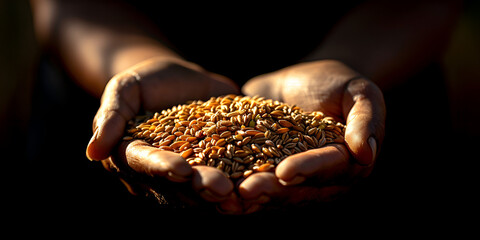
Introduction
World hunger is a persistent global issue that affects millions of people daily. World hunger refers to the chronic lack of sufficient food to meet basic nutritional needs, leading to malnutrition and other health issues. Addressing world hunger is crucial as it is closely tied to the overall development, health, and stability of societies.
Causes of World Hunger
Poverty Poverty is one of the primary drivers of world hunger. When individuals and families do not have the financial means to purchase food, they suffer from food insecurity. Limited access to resources and economic opportunities traps people in a cycle of poverty and hunger.
Conflict Conflicts disrupt food production and distribution, leading to shortages and high food prices. Wars and civil unrest force people to flee their homes, leaving behind their means of livelihood and worsening food insecurity in affected regions.

Impact of World Hunger
Health Consequences Chronic hunger leads to malnutrition, which can cause stunted growth in children, weakened immune systems, and higher susceptibility to diseases. Malnourished individuals often face lifelong health challenges that hinder their ability to contribute productively to society.
Economic Consequences Hunger also has significant economic impacts. Malnutrition reduces labor productivity and increases healthcare costs, which hampers economic growth. Countries burdened by high levels of hunger struggle to develop economically, creating a vicious cycle of poverty and food insecurity.
Regions Most Affected by World Hunger
Sub-Saharan Africa Sub-Saharan Africa is one of the regions most affected by hunger. Factors such as drought, conflict, and poor infrastructure exacerbate food insecurity, making it difficult for communities to access sufficient nutrition.
South Asia South Asia also faces severe hunger issues. High population density, poverty, and inadequate food distribution systems contribute to widespread malnutrition and food insecurity in this region.

Efforts to Combat World Hunger
International Organizations Organizations like the United Nations World Food Programme (WFP) and Food and Agriculture Organization (FAO) work tirelessly to combat hunger. These organizations provide food aid, support agricultural development, and promote sustainable food systems.
Government Initiatives Many governments have implemented programs to reduce hunger and improve food security. Initiatives such as food subsidies, school meal programs, and agricultural support aim to alleviate hunger and improve nutrition among vulnerable populations.
Innovative Solutions to World Hunger
Sustainable Agriculture Sustainable agriculture practices can significantly reduce hunger by increasing food production and preserving the environment. Techniques such as crop rotation, organic farming, and agroforestry help maintain soil health and boost crop yields.
Food Technology Advancements in food technology, such as genetically modified crops and improved storage methods, can help combat hunger. These innovations enhance food production, reduce waste, and ensure that nutritious food reaches those in need.

Role of Education in Combating Hunger
Agricultural Education Educating farmers about sustainable farming practices and new agricultural technologies can increase food production. Training programs and extension services help farmers improve their yields and livelihoods.
Nutrition Education Teaching communities about nutrition and healthy eating habits is crucial in the fight against hunger. Nutrition education programs can help individuals make informed choices about their diets and improve their overall health.
Importance of Global Cooperation
Multinational Partnerships Global cooperation is essential to address world hunger. Partnerships between countries, international organizations, and NGOs can pool resources and expertise to tackle food insecurity more effectively.
Trade Policies Fair and equitable trade policies can help improve food security by promoting the exchange of food products and agricultural goods. Reducing trade barriers and supporting small-scale farmers in developing countries are vital steps in this direction.

How Individuals Can Help
Donations Individuals can contribute to the fight against hunger by donating to reputable organizations working to alleviate food insecurity. Even small contributions can make a significant difference in providing food and resources to those in need.
Advocacy Raising awareness about world hunger and advocating for policies that support food security can create lasting change. Engaging in community efforts and supporting campaigns that promote sustainable food systems are powerful ways to help combat hunger.

Case Studies of Successful Hunger Reduction Programs
Brazil’s Zero Hunger Program Brazil’s Zero Hunger Program has successfully reduced hunger and poverty through comprehensive measures such as cash transfers, school meals, and support for family farming. The program’s integrated approach has been a model for other countries.
India’s Midday Meal Scheme India’s Midday Meal Scheme provides free lunches to schoolchildren, improving nutrition and encouraging school attendance. This program has had a significant impact on reducing child malnutrition and promoting education.

Challenges in Combating World Hunger
Climate Change Climate change poses a significant threat to food security by affecting crop yields, water availability, and weather patterns. Adapting agricultural practices to changing climates is essential to ensure food production remains stable.
Political Instability Political instability and corruption can hinder efforts to combat hunger. Conflicts and poor governance disrupt food distribution and undermine initiatives aimed at improving food security.

The Future of World Hunger
Predictions and Trends While progress has been made, world hunger remains a critical issue. Emerging trends in technology and global cooperation offer hope, but sustained efforts are needed to address the root causes of hunger and build resilient food systems.
Goals for Hunger Eradication The United Nations has set a goal to end hunger by 2030 as part of the Sustainable Development Goals (SDGs). Achieving this goal requires collective action, innovative solutions, and strong political will.
Technological Advancements and World Hunger
Precision Agriculture Precision agriculture uses technology to optimize farming practices, increasing efficiency and reducing waste. Tools like drones, sensors, and GPS mapping help farmers manage their resources more effectively.
Biotechnology Biotechnology can improve crop resilience and nutritional content, helping to ensure food security. Genetically modified organisms (GMOs) and biofortification are examples of how biotechnology can address hunger.
Myths and Misconceptions about World Hunger
Misunderstandings about Food Scarcity A common misconception is that there is not enough food to feed the world. In reality, the issue lies in the distribution and access to food rather than the overall supply.
The Role of Waste Food waste is a significant contributor to world hunger. Reducing food waste at all levels of the supply chain, from production to consumption, is crucial in combating hunger.

Conclusion
In summary, world hunger is a complex issue that requires a multifaceted approach. Addressing it involves understanding its root causes, implementing innovative solutions, and fostering global cooperation. Education, technology, and individual contributions also play vital roles in this fight. By working together, we can make significant strides toward a world where no one goes hungry.

FAQs (Frequently Asked Questions)
- What is the main cause of world hunger? The primary cause of world hunger is poverty, which limits access to food and resources necessary for adequate nutrition.
- How does climate change affect food security? Climate change impacts food security by altering weather patterns, reducing crop yields, and increasing the frequency of extreme weather events, which can disrupt food production and distribution.
- What role do international organizations play in combating world hunger? International organizations, such as the UN World Food Programme, provide food aid, support sustainable agricultural practices, and advocate for policies that improve food security globally.
- How can individuals contribute to reducing world hunger? Individuals can help by donating to hunger relief organizations, advocating for policies that support food security, and reducing food waste in their own lives.
- What are some successful examples of hunger reduction programs? Brazil’s Zero Hunger Program and India’s Midday Meal Scheme are notable examples that have significantly reduced hunger and improved nutrition through comprehensive, integrated approaches.




